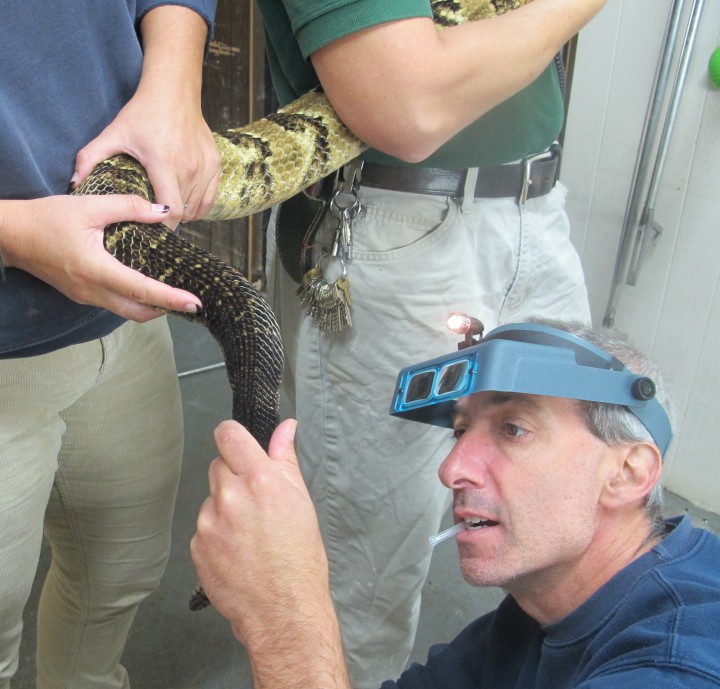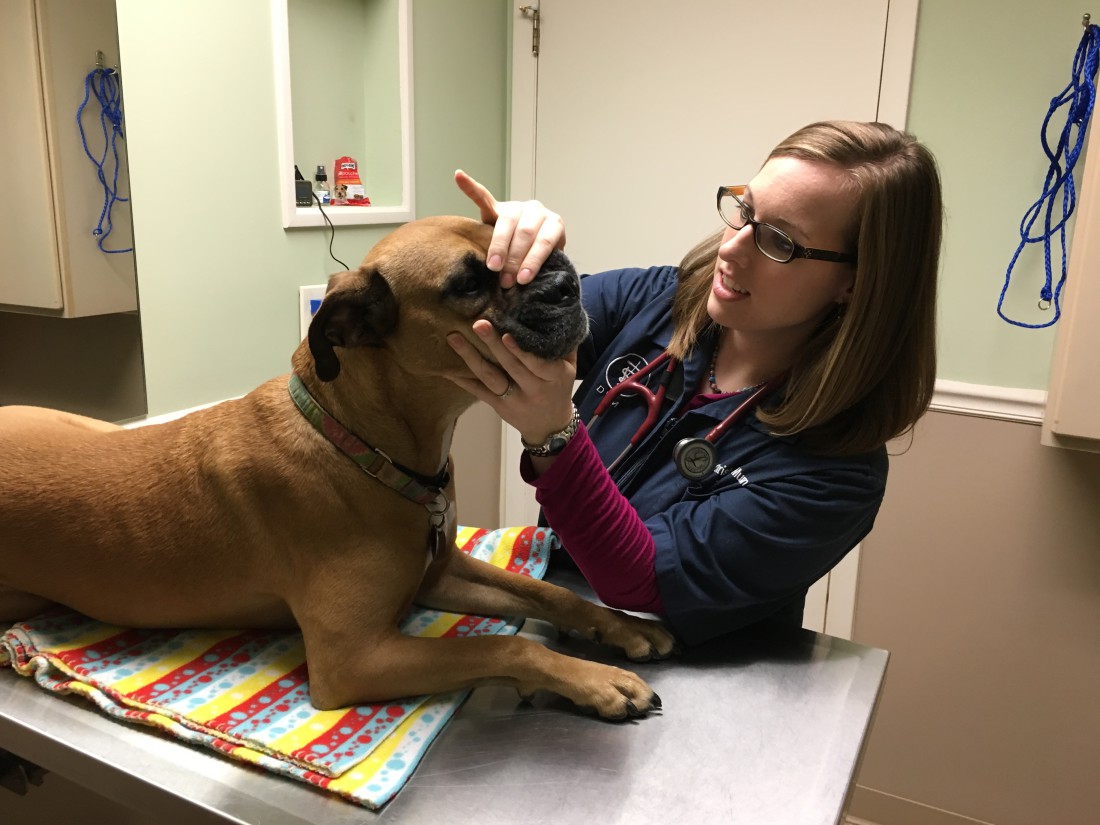Ensuring your pet has an annual exam as well as vaccinations and parasite treatment can prevent many serious illnesses, say a number of Asheville-area veterinarians and pet care professionals.
“A good checkup is probably the most important thing you can do to get started,” says Mark Ledyard, veterinarian and owner of Charlotte Street Animal Hospital in Asheville. An exam covers every aspect of the animal’s health and care, and, he says, “gives us that opportunity to have a discussion with the client about [their pets’] history, if there are things they are noticing, any changes, any questions they have as far as nutrition and all those kinds of things. Then we’re [also] looking to see if there’s any issues as far as infections, masses that might be tumors, looking for heart murmurs, any orthopedic problems.”
Vaccines and parasite control are another important part of preventive care. Beth Jones, a veterinarian and owner of Asheville Animal Acupuncture and Wellness Clinic agrees, noting that the early vaccines, such as parvo and distemper for puppies and feline leukemia and upper respiratory viruses for kittens, as well as rabies for both, are especially important.

“Another part of prevention is parasite prevention, like heartworm, roundworm, fleas and that sort of thing, because we see a lot of intestinal worms in this area,” says Jones. “Intestinal parasites like roundworms, hookworms, whipworms and tapeworms — those are the big four.”
Exams, vaccines and parasite treatment are important because many conditions, including parasites, can remain hidden until they become a serious health threat, says Ledyard. “By the time you see an animal sick from heartworm, the reason you’re noticing it is because they are essentially going into heart failure,” he says. They can be treated to get rid of the heartworms, but by that point “you can’t fix the damage to the heart.”
Pet owners may feel silly brushing their cat’s or dog’s teeth, but three of the four veterinarians Xpress spoke with say dental hygiene is an important part of preventive care. “The healthier you keep their teeth, the healthier they’ll be in the long run,” says Christina Munn, veterinarian at Skyland Animal Hospital in Asheville. “When you have plaque and tartar built up on the teeth and gum line, a lot of bacteria live in there, and that bacteria can go into bloodstream, which can affect the heart and the kidney. Keeping their teeth healthier helps them have less pain or irritation in the mouth, and it also keeps their organs healthier.”
In addition to vaccines and parasite prevention, “biologically appropriate food” is in Jones’ top three recommendations for keeping pets healthy. “Foods that are biologically appropriate, that have the right amount of protein and the right kind of protein for carnivore animals likes dogs and cats … can prevent so many things down the line, just like for us,” says Jones, an Asheville native. “Nutrition is now a big part of how I treat my patients for sure,” she says. After nearly 20 years of practicing regular veterinary medicine, Jones now exclusively offers veterinary acupuncture, Chinese herbs, cold laser therapy and nutrition therapy.
The wild animals at the Western North Carolina Nature Center in Asheville also reap the benefits of preventive care, says the center’s veterinarian Ross Prezant. “We literally do an exam, as much as is possible, on every animal,” he says, referring to the Nature Center’s 300 critters — a diverse mix of indigenous species that includes timber rattlesnakes, otters, gray wolves, Eastern newt, red fox and North American black bears.

For example, he says, “The cougars get knocked out once a year. We clean their teeth. We go over them head to toe. We take blood and urine samples.
“A big part of the annuals, and this is kind of funny to a lot of people, is dental cleanings,” Prezant continues. “Just like dogs and cats get their teeth cleaned, we do everything from getting tartar off to dealing with broken teeth, because no one is going to be able to tell [that something is wrong] until we get in there. I actually do a lot of dental work.”
Thanks to such preventive care, the animals at the Nature Center “often live double or triple the years they would live in the wild,” says Prezant, who also gives kudos to the keepers who are with the animals every day. “A deer, I’ve been told by the biologists, lives 4 to 6 years in wild; a 6-year-old deer is an old deer in the wild. We have a deer who is 17 [years old] this year and is still doing pretty good.”
What is the cost of preventive care for cats and dogs? “The prices for these services vary tremendously, and the things that vets consider essential also vary,” says Jones.
According to Ledyard, the average annual cost can be $1,300 for a healthy dog and $1,100 for a healthy cat. Denise Bitz, founder and president of Brother Wolf Animal Rescue, says, “We usually tell people to save about $500 to $600 a year for preventive care for their dogs or cats.” Some veterinary clinics such as Banfield Pet Hospital in Asheville offer monthly plans, she says.
Banfield’s plans run from $20 to $40 a month for a range of preventive and chronic care for dogs and cats. Charlotte Street Animal Hospital also offers a monthly payment plan for preventive care that costs $42 to $44 a month, according to the website.
“The wellness plan where you pay a set amount each month” can be helpful, says Ledyard, because “instead of getting a bill of $250 when you come in for a visit, you can pay a little bit along the way.”
Meanwhile, skipping preventive care can be risky for both a pet’s health and the pocketbook, says Bitz. For example, treating a heartworm-positive, 40-pound dog costs Brother Wolf between $300 and $500, she says. And treating a dog who was on “death’s doorstep” from parvo cost the organization close to $4,000. It “could have all been prevented if he would have been given a series of very inexpensive vaccines,” she says.
For people who are facing financial hardship, the Asheville Humane Society offers low-cost vaccine clinics in a number of Western North Carolina locations. The nonprofit also provides information to help owners access other low-cost veterinary services, says Kim Roberts, associate director of community engagement. “All our community programs are really focused on doing what we can to help people keep their pets in their home,” she says.
A 2015 study by American Society for the Prevention of Cruelty to Animals showed that people with incomes below $50,000 were significantly more likely to rehome their animals as a result of cost and housing issues. To help keep pets out of the shelters, Roberts explains, “The low-cost vaccine clinic not only helps people get in compliance with the law, because rabies vaccines are required by law, but also allows them to get other vaccines as well to help prevent diseases [thereby preventing] the need for high vet bills,” says Roberts.
Preventive care can save money in the long run, says Ledyard. “It’s the same on the human side: If you spend a little money on preventive care, you’ll save money, because if you’re able to prevent disease, it’s definitely cheaper than having to get sick and having to pay for a hospitalization.”
More Info
Mark Ledyard, DVM
charlottestreetanimalhospital.com
Beth Jones, DVM
ashevilleanimalacupuncture.com
Christina Munn, DVM
skylandanimalhospital.com
Western North Carolina Nature Center
wncnaturecenter.com
Brother Wolf Animal Rescue
bwar.org
Asheville Humane Society
ashevillehumane.org






I’m slightly concerned that the misinformation regarding vaccines (the veterinary profession’s #alternativefacts?). It can be essential for early disease prevention in most (but not all) circumstances. The truth of the matter is that over-stimulation of the immune system (i.e. vaccinating an immune animal) pre-disposes to the development of allergic and chronic disease and even cancer. Duration of immunity studies show that a DHPP vaccine provides parvo and distemper protection for AT LEAST 7 – 9 years. Over-vaccination causes suffering in our pets. Whatever happened to ‘above all, do no harm’? I for one, am ashamed of the part I used to play in the travesty that is veterinary vaccination protocols.
Thank you for your comments Margaret Finlay. Two of the vets I interviewed did in fact say that they are using vaccines more thoughtfully these days and less often. That aspect of vaccines and how often they are needed was beyond the scope of this article. Perhaps the Mountain Xpress will consider covering this topic in a future issue.
Dr. Jones: cats are carnivores, but dogs are not! they are omnivores, and require a different “biologically appropriate diet” for this reason.
(and Dr. Prezant should stop uncapping needles with his mouth … an OSHA violation.)